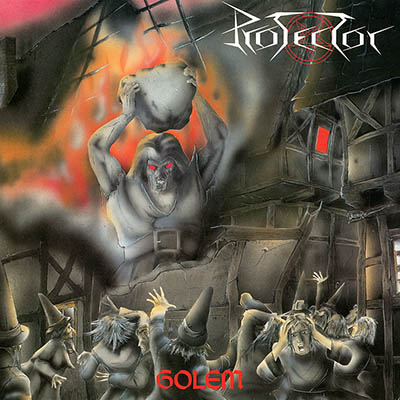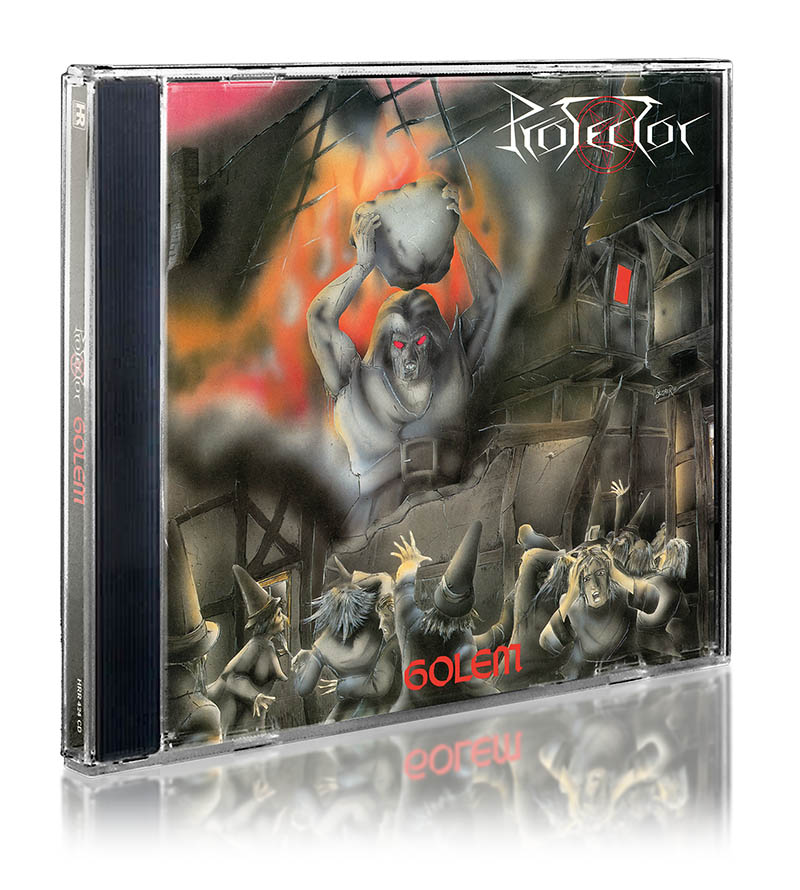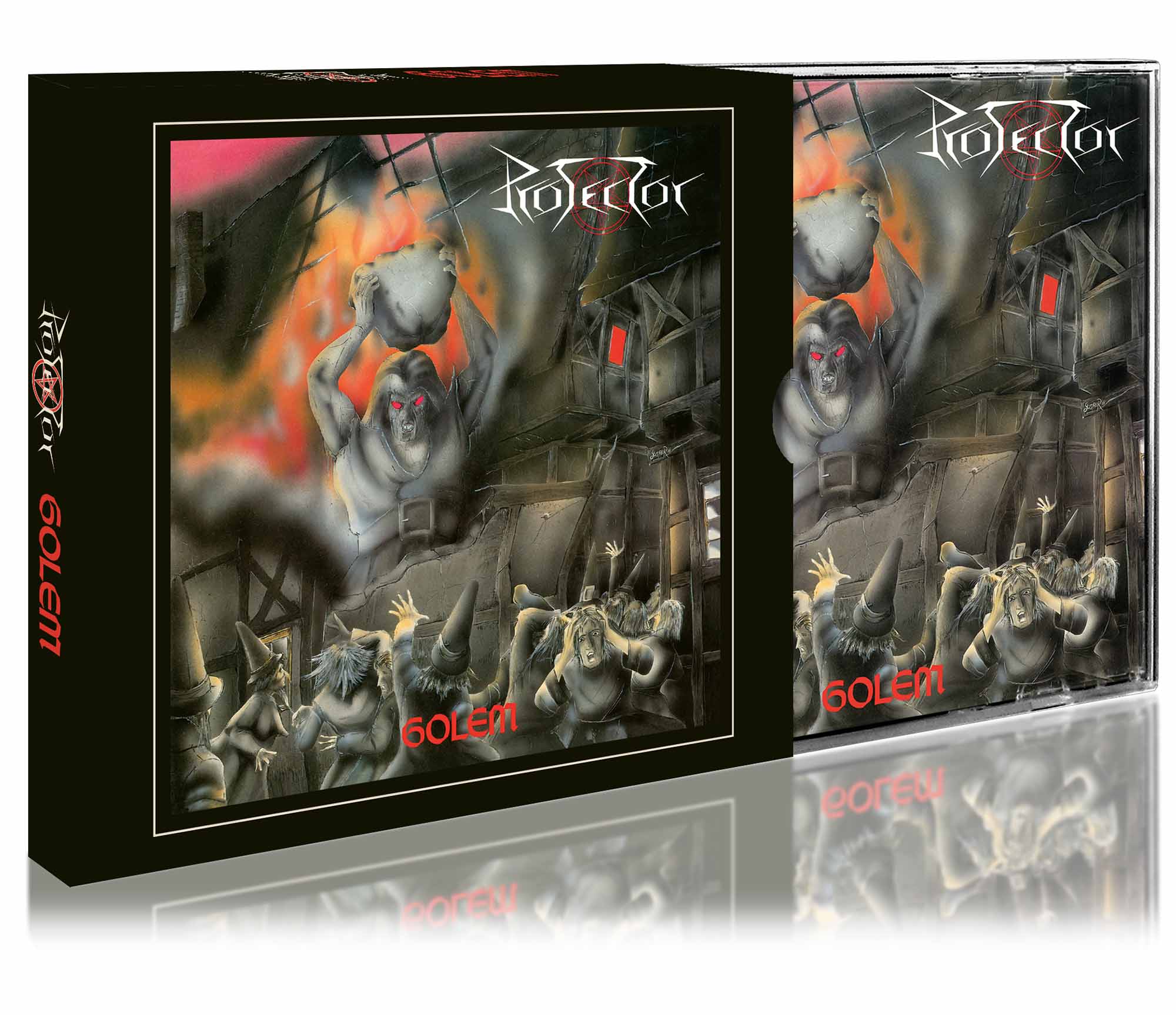 | ||||
| PROTECTOR - Golem CD | |
HRR 424CD, jewelcase, HRR 424CDSC, slipcase, poster | |
| Martin Missy - Vocals Hansi Müller - Guitars Ede Belichmeier - Bass Michael Hasse (R.I.P. 1994) - Drums | |
| -Delirium Tremens -Apocalyptic Revelations -Golem -Germanophobe -Protector of Death -Operation Plaga Extrema -Megalomania -Only the Strong Survive -Omnipresent -Space Cake | |
| jewelcase CD SOLD OUT! SLIPCASE CD: AVAILABLE | |
“Golem” was the first full-length release by Protector, a savage masterpiece from one of the most underrated but nevertheless most important and influential thrash/death outfits from the 80s. The four-piece from Lower Saxony had been playing together since 1986, and with one official release up their sleeves the band now consisted of Hansi Müller (git), Michael Hasse (drums), Ede Belichmeier (bass) and Martin Missy on vocals, thus the same crew who had already hammered in the debut-EP “Misanthropy” from 1987. “Golem” is the first of two full-length releases from the first incarnation of Protector featuring vocalist Martin Missy. His absolutely vile vocal performance which always borders on early, evil, murky death metal is one reason why “Golem” is widely regarded as a landmark in the history of extreme metal, especially that of death/thrash.
Among the wave of Germanic thrash flooding the scene back then, Protector have always stood out due to their exceptional songwriting-skills including daring tempo changes and top-of-the-line musicianship. Full to the brim with high speed killer riffs and leaning heavily towards early death, “Golem” is easily on par with other German thrash metal milestones such as “Pleasure to Kill” or “Infernal Overkill”. Although Protector’s fame may not entirely match that of compatriots like Kreator, Sodom or Destruction, they were most important for the early death/thrash scene, taking things to another level: Protector were more brutal, heavier and more extreme than the above mentioned bands – a bit ahead of their time maybe? Reactions in the media were overall positive but nevertheless pointing out, that this stuff was “only for the hardboiled!” Martin Missy recalls how press and fans reacted to the release: “It was almost the same as with our previous recordings: We got a lot of positive response from the fans and the underground-magazines. The bigger magazines were a little more sceptical about our music, but they still gave us somewhat better reviews than for Misanthropy.”
Protector recorded their first full-length release in the summer of 1988 in the Phönix Studio in Bochum, Germany – a time still infused with very iconic memories for Martin Missy: “For the recordings we had moved into an apartment right above the studio. I remember that one day we were sitting in the living room, with the windows open, and we were listening to the bands that played at the Monsters of Rock at the Ruhrstadion in Bochum.” Writing and recording the album worked pretty much the same way as it had done the year before: “Hansi, Michael and Ede put together the songs, and I wrote the lyrics afterwards. I also made a small contribution to the songwriting-process: I suggested that Michael should use the floor-tom instead of the hi-hat in the Song ‘Golem’. I got that idea from the Agnostic Front song ‘Power’”. With a bit more experience under their belts, Protector could apply what they had learned while making their demos and the EP: The song structures on “Golem” are more complex, and the sound is cleaner than on “Misanthropy”. Apart from the Protector crew, there was someone else from the history books of thrash metal involved in recording the album: The last song, the short but sweet thrash outburst “Spacecake”, comes with guest vocals from Sodom’s very own Tom Angelripper.
As mentioned above, the press seemed to be a bit overwhelmed by the speed and fierceness of “Golem”, but still, this album helped a lot to make the name Protector even better known in the underground scene of the 80s. Missy defines the status of his own band more accurately: “With ‘Golem’ I would say we were able to establish ourselves among the top-20 of German thrash bands.”
The re-release of “Golem” comes without any alterations and no extra frills – just pure death/thrash that was ahead of its time in 1988 and will still you blow you away in 2015. Be sure to get your copy, and prepare properly for the next Protector show: “The title-song of the album became one of our most popular songs among our fans. We still play it live at every gig!”
Ulrike Schmitz

